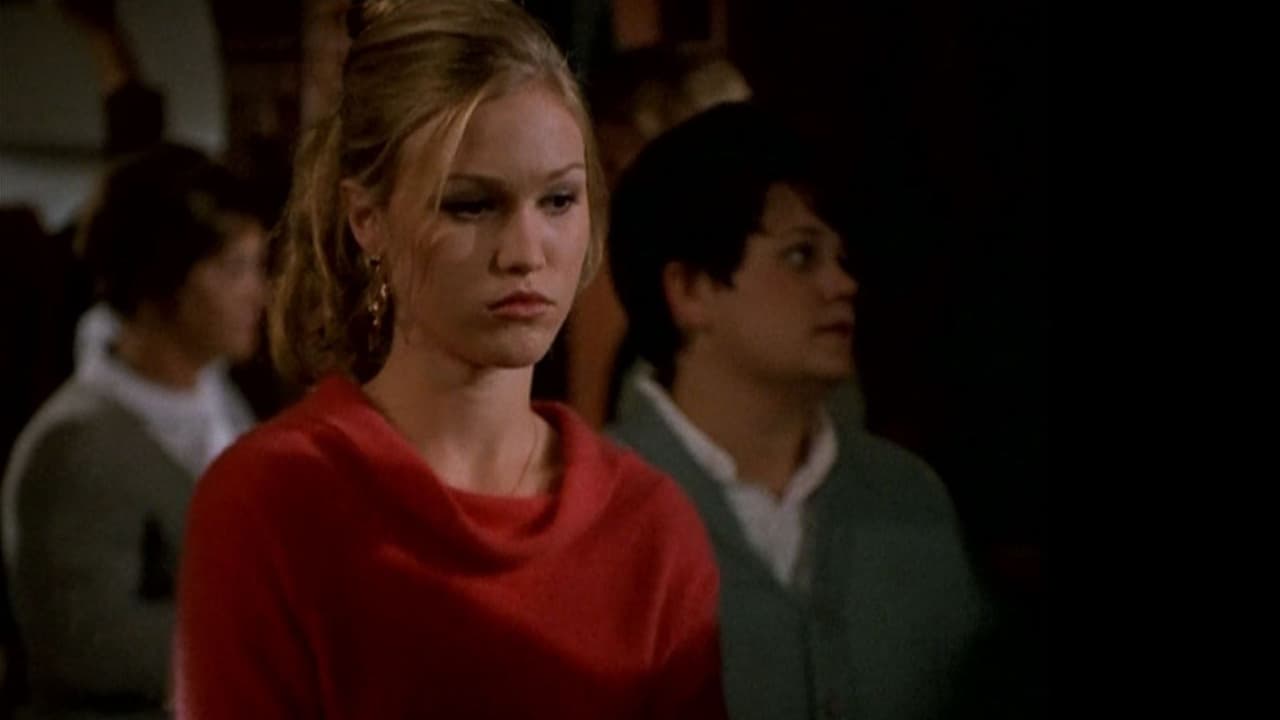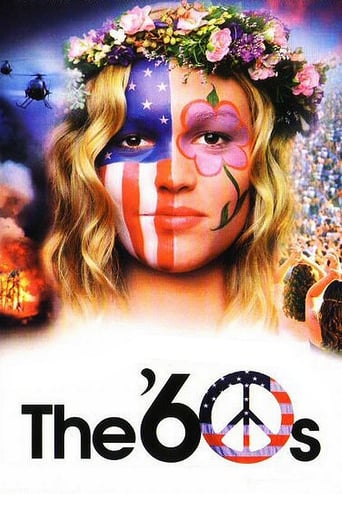

Slow pace in the most part of the movie.
... View MoreFantastic!
... View MoreThe acting in this movie is really good.
... View MoreThere is definitely an excellent idea hidden in the background of the film. Unfortunately, it's difficult to find it.
... View MoreSo there's a lower middle-class family in Chicago who live a very conservative existence. Well, what happens when their oldest son goes to Vietnam, their youngest son becomes a civil rights activist, and their daughter gets knocked up? The '60s happen, and this mini-series shows the family's trials and tribulations during a truly extraordinary decade.What I loved about "The '60s" is that the story is not unlike the normal stories that one would hear about families from back then. The 1960s were a confusing time, with people taking sides and going against everything they were ever raised to believe. The individual stories of the characters keep the big picture interesting. I couldn't wait to see Part 2 when Part 1 ended.Great acting performances by all, especially Jerry O'Connell for his depiction of a Vietnam Veteran who goes in a patriot and comes out a basket-case.I recommend "The '60s" to anyone who wants to see a realistic depiction of one of the greatest eras in United States History. You definitely won't be disappointed.
... View MoreWhat the movie The 60s really represents (to those of us who growled around in the belly of America in those times) is the turbulence and diversity of the decade. Despite the exaggerated, stereotyped characters, the genuineness of the issues remains clear.Not only were those radical times of change, but also very confusing times. Two basic things changed our world then: the 1964 Civil Rights Act, and the overwhelming influence of the media. Those two new freedoms began social changes that soon became institutionalized.From chaos came sensitivity, from disorder came values. Bear in mind however, that the bulk of Americans were not involved in this... they worked, they played, they watched the news... and slowly they became effected by the efforts and struggles of the minorities... the Civil Rights workers, the Political Activists, the Anti-War efforts, the War on Poverty....The representation of the power of the press and TV in particular, was well reflected, although the conflict between the general public's attitude and those seeking to change things was at best ignored... and at worst, misrepresented.. Middle class Americans weren't all standing around angrily holding baseball bats, or disowning their wayward daughters. They were confused too. Let us not forget how Folk Singers suddenly became Protest Singers, and how The Beatles began an onslaught that killed the Folk-Protest Movement. There are no Beatle songs in the movie, or even any mention of them.I think if you didn't live the decade, you might not have a sense of what the movie is about, the overall picture is a bit dim. At one point I held down a steady job while my sister lived at the Hog Farm Commune and went to Woodstock. At another point I was in Haight Asbury and in the Detroit Riots while she worked and played the housewife in Maine and Connecticut. Roles were constantly changing.The movie depicts three siblings of a middle class family. They represent the hippie child, the political activist, and the active military personnel. Dad represents the typical attitudes, and mom represents the voice of reason, tolerance, and sometimes compromise... for the sake of peace.The Black family comprises a minister and his son... disproportionately, I think. I assume the producers knew all the variables and had to settle on limitations, or else the film would have become a long, boring, documentary. Dad's message was that anger produces bitterness, and bitterness produces chaos. It was clearly a message directed to today's youth.We are looking at a unique solution to social problems, and also how issues divide us... The 60s were unusual in that way, and only the Roaring 20s compare. In other words, this movie has a moral after all. In the end, it is our Collective Individualism that survives. Put that in your oxymoron list.Everyone was a God, a Guru, or a free-spirited genius in the 60s. It was a time of magic and madness. No one will ever nail the 60s down right... it was too diverse (this movie is close). At least we can say we are not ashamed of it, that we learned and grew from it, and that for once, a generation shaped and changed America... for the better.
... View MoreI watched it when NBC showed it, then when it came onto video I bought it. I think it shows the 60s pretty accurately. The other reviewer must have been a child during the 60s. A lot of young people during this time went threw the same things the charters did. I now show it to all my history classes when we study the 60s!
... View More"The '60s" TV miniseries would have you believe that between the years 1962 and 1969, the United States of America - the last conservative stronghold of the Western world - did an abrupt about-face and sped off to the left, never to return. Not only is this a gross generalization, but it is also based on naive assumptions and faulty logic that anyone with a high school diploma can readily refute.Take the issue of race, for example. This movie argues that Negroes were relentlessly persecuted all the way up to 1965, so what choice did they have but to rebel? Well, maybe America's racist chickens DID come home to roost in the Sixties - but it wasn't because white Americans were just sitting idly by. Full equality for African-Americans had already been provided for by the Civil Rights Acts of 1957 and '64 and by the Voting Rights Act of '65, so there was absolutely no reason for young black men to go hog wild during the latter part of the decade. They may have looked smart in their snappy berets, but in reality most - if not all - advocates of Black Power succeeded only in making a mockery of the civil rights movement with their penchant for violence and their irrational fear of all whites."The '60s" likewise tries to prove that prior to 1962 and the dancing of The Twist, exuberant sexuality in America simply didn't exist. What nonsense. The so-called sexual revolution wasn't really so radical when one considers that the forces behind it had been fermenting for decades (Margaret Sanger's crusade for birth control, for instance). The people who put this miniseries together apparently also consider the Fifties to be a time of cardboard, puritanical sexlessness. But that belief simply doesn't hold water. Was it not during the '50s that Elvis Presley provocatively swiveled his hips and Marilyn Monroe had her dress blown up past her waist? Not to mention Playboy magazine, Bettie Page pinups, and the word "rock 'n' roll" itself, which was originally a euphemism for sex. When you get right down to it, the revolution wouldn't have come as quickly as it did had it not been for the introduction of the birth control pill in 1960, which made sex more common only because it made it less hazardous.And what about Vietnam? This movie simply shows that conflict blowing up in our faces in 1964. What it doesn't show is that the war in Indochina had been raging since 1954 - ten years earlier. The top brass in Washington - if not the American public at large - had been keeping abreast of the events in Southeast Asia since day one. In fact, Dwight D. Eisenhower had the opportunity to nip the entire Vietnam conflict in the bud during his first term, when he refused to give aid to the French at the siege of Dienbienphu. Yes, LBJ must bear the brunt of the blame for what happened to our boys; but we wouldn't have gotten into such a pickle in the first place if Ike hadn't sat on the teakettle a decade earlier. The movie also focuses almost exclusively on the activities of war protesters, failing to note that most Americans actually supported the war to the bitter end.One final note: the movie opens with an ironic presentation of that bland, insipid, happy-go-lucky Fifties sitcom "Ozzie and Harriet." Good point, but it's not as if we were all watching blood-soaked shoot-'em-ups and kinky S&M on TV by 1969. As a matter of fact, by the end of the decade Americans were watching bland, insipid, happy-go-lucky Seventies sitcoms like "The Brady Bunch."I may be only 20 years old, but I know my American history. And "The '60s" gets a lot of it wrong.
... View More